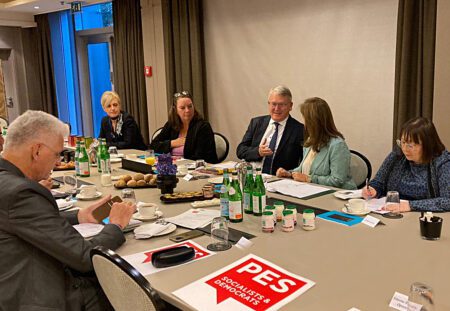With just months until the end of this European mandate, socialist and democratic employment and social affairs ministers are pushing ahead with policies that will deliver stronger rights for working people.
A platform work directive that meaningfully improves conditions for workers, the importance given to social issues in the European Semester and in relations to EU fiscal rules– these topics were at the heart of a strategic discussion as ministers from the Party of European Socialists (PES) met in Luxembourg this morning to coordinate ahead of the Employment, Social Policy, Health and Consumer Affairs Council (EPSCO) later today.
Meeting Chair and Portuguese Minister for Labour, Solidarity and Social Security, Ana Mendes Godinho, said:
“At a time when people across Europe face a cost-of-living crisis, we have a responsibility to act. We are pushing to do everything we can at the European level to improve conditions for workers.
“We are focused on delivering a platform work directive. Not just any version of it, but a directive that provides real security. The social rights of 28 million workers in the EU are on the line. We have nine months left to make it happen.
“We are also pushing back hard against Conservatives’ and Liberals’ attempts to twist EU economic governance reforms into an excuse for a return to austerity. The European Pillar of Social Rights must be a critical piece of the European Economic Governance. Economic, environmental, social and education policies should go hand in hand. At this moment Europe must be focused on unleashing public investment for the green and digital transitions. That is how we deliver prosperity and security for Europe’s workers: by creating a “lay-on” mechanism to support companies and protect jobs, by taking further initiatives to promote dynamic collective bargaining and increase its coverage, as well as by introducing social conditionalities linked to public funding, support to businesses and public procurement.”
Reflecting on the second trilogue on the platform work directive, ministers pledged to continue fighting for a strong, progressive outcome on the file. Thanks to pressure from the PES family, in both Council and Parliament, negotiations have started in earnest. It is now vital that they take the next steps and agree on a directive that meaningfully enhances the rights of Europe’s 28 million platform workers. Socialists will fight against all attempts by conservatives and liberals to weaken the outcome.
Ministers also exchanged on the European Semester and Social Convergence Framework, reaffirming that they will push to reinforce the social dimension of the Semester. The meeting welcomed that the Social Convergence Framework will now be applied, which constitutes a major step forward for social policy. This new instrument for social progress has been developed based on a Belgian and Spanish proposal and has become operational thanks to the initiative of Nicolas Schmit and the Commission. Additionally, the meeting exchanged on the Belgian and Spanish initiative to examine how to better connect social investment and the EU fiscal rules.
Recommendations on the social economy and negotiations on improving democracy at work by strengthening European Work Councils were also discussed by meeting participants.
Ministers welcomed Romanian minister of labour and social solidarity, Simona Bucura Oprescu, to the PES EPSCO meeting for the first time.
The meeting was attended by:
- Ana Mendes Godinho, meeting Chair, Minister of Labour, Solidarity and Social Security, Portugal
- Nicolas Schmit, European Commissioner for Jobs and Social Rights, European Commission
- Rolf Schmachtenberg, State Secretary at the Ministry of Labour and Social Affairs, Germany
- Michael Falzon, Minister for Social Justice and Solidarity, the Family and Children’s Rights, Malta
- Simona Bucura-Oprescu, Minister for Labour and Social Solidarity Protection, Romania
- José Luis Escrivá, Minister for Inclusion, Social Security and Migration, Spain
- Igor Feketija, State Secretary, Minister for Labour, Family, Social Affairs and Equal Opportunities, Slovenia (Observer)
- Agnes Jongerius, EMPL Coordinator, Member of the European Parliament, S&D
- Esther Lynch, General Secretary, ETUC



